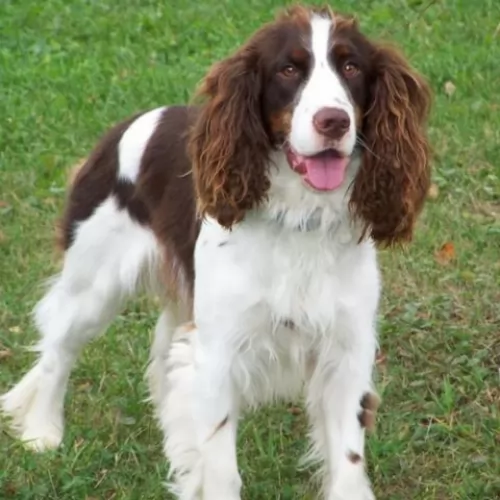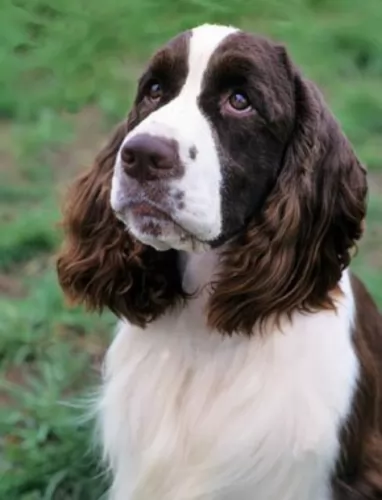 Petzlover
Petzlover English Springer Spaniel is originated from United Kingdom but Pudelpointer is originated from Germany. English Springer Spaniel may grow 17 cm / 6 inches shorter than Pudelpointer. Both English Springer Spaniel and Pudelpointer are having almost same weight. Both English Springer Spaniel and Pudelpointer has same life span. Both English Springer Spaniel and Pudelpointer has almost same litter size. Both English Springer Spaniel and Pudelpointer requires Low Maintenance.
English Springer Spaniel is originated from United Kingdom but Pudelpointer is originated from Germany. English Springer Spaniel may grow 17 cm / 6 inches shorter than Pudelpointer. Both English Springer Spaniel and Pudelpointer are having almost same weight. Both English Springer Spaniel and Pudelpointer has same life span. Both English Springer Spaniel and Pudelpointer has almost same litter size. Both English Springer Spaniel and Pudelpointer requires Low Maintenance.
 The English Springer Spaniel is one of many gun dog breeds that flush and retrieve. They descended from the Shropshire Spaniels and Norfolk Spaniels. The English Springer Spaniel is somewhat similar to the Welsh Springer Spaniel and believe it or not they are also closely related to the English Cocker Spaniel. In the last century the cockers and springers came from the same parents. The larger dogs flushed game and made game “spring” from the brush while the smaller dogs – the “cockers” would hunt woodcock. Eventually through specific breeding, the UKC of England recognized the “springers” as a separate breed.
The English Springer Spaniel is one of many gun dog breeds that flush and retrieve. They descended from the Shropshire Spaniels and Norfolk Spaniels. The English Springer Spaniel is somewhat similar to the Welsh Springer Spaniel and believe it or not they are also closely related to the English Cocker Spaniel. In the last century the cockers and springers came from the same parents. The larger dogs flushed game and made game “spring” from the brush while the smaller dogs – the “cockers” would hunt woodcock. Eventually through specific breeding, the UKC of England recognized the “springers” as a separate breed.
Sydenham Edwards, in 1801, proposed that the spaniels be divided into the Springing or Hawking Spaniel and the Cocking or Cocker Spaniel. From this point on there was a flourish in the development of spaniel breeds in the 19th century. They were usually named for the county in which they were founded or after the individual who developed them. In 1902, the English Springer Spaniel was officially recognized as its own breed by the UKC. It was not until 1910 that the AKC recognized them as well.
 The Pudelpointer is cross between the Poodle and the English Pointer. The first Pudelpointer was bred in 1881 by Baron Von Zedlitz in Germany.
The Pudelpointer is cross between the Poodle and the English Pointer. The first Pudelpointer was bred in 1881 by Baron Von Zedlitz in Germany.
The idea was to bring about a gun dog highly skilled in tracking and retrieving. The Pudelpointer was introduced to North America in 1956, and in 1977 the Pudelpointer Club of North America was established.
Because breeders have avoided recognition by the American Kennel Club, the Pudelpointer never became a well known breed in the United States.
 Among spaniels the English Springer is medium size and well compacted. Both the working dog and the show dog sport moderately long coats and a friendly tail. They both wear a gentle expression in their eyes. But there the commonality stops as the difference between the working English Springer Spaniel and the show line is greater in this breed than in any other. The gene pools have become almost separate over the last 70 years. If you put a field dog in the show ring they would not be able to compete. If you put a show line English Springer in the field, they would not have the stamina or speed for field trials.
Among spaniels the English Springer is medium size and well compacted. Both the working dog and the show dog sport moderately long coats and a friendly tail. They both wear a gentle expression in their eyes. But there the commonality stops as the difference between the working English Springer Spaniel and the show line is greater in this breed than in any other. The gene pools have become almost separate over the last 70 years. If you put a field dog in the show ring they would not be able to compete. If you put a show line English Springer in the field, they would not have the stamina or speed for field trials.
The field line has a coarser coat and less pendulous ears. They may dock a few inches off the tail, and they are much scruffier than the show dogs. On the other hand, the show dogs have dewlaps, pendant ears and dangling flews. They are heavier and thicker than the field dog. They have long muzzles, not so prominent eyes and docked tails. The English Springer Spaniel stands tall and proud, coming from an ancient line of Spaniels
 The Pudelpointer stands at between 55 and 68cm in height and weighs between 20 and 30kg. He is a medium sized dog with a weather resistant, double-layered coat. The coat doesn’t shed much and is usually a brown, chestnut, liver or black color.
The Pudelpointer stands at between 55 and 68cm in height and weighs between 20 and 30kg. He is a medium sized dog with a weather resistant, double-layered coat. The coat doesn’t shed much and is usually a brown, chestnut, liver or black color.
The coat is usually dense, harsh and wiry. They have floppy ears with quite a unique feature - the mustache on the muzzle. The tail is docked, with about 30% being removed, giving the dog an attractive, distinctive look.
Full of energy, the lively Pudelpointer will love to find himself in a family where they are active, outdoorsy types. He loves water too, and when out on a hike, if there’s water around, he’ll be the first to jump right in.
He’s an intelligent dog too, eager to please and ready to learn. He can easily be trained and socialized. He is loyal, calm and loving and will get on well around children and other animals in the home. He is also protective and makes a good watchdog.
 The English Springer Spaniel is a friendly dog who loves to please his people. They are great family dogs, easy-going and affectionate. In addition, they are attentive and alert which makes them such great hunting dogs. With exceptional speed and stamina, he needs activity to stimulate his body and brain. He is very intelligent. That intelligence can lead to stubbornness as well. He’d great with kids and good with other pets with perhaps the exception of cats. The breed is in love with water and will get in at any time.
The English Springer Spaniel is a friendly dog who loves to please his people. They are great family dogs, easy-going and affectionate. In addition, they are attentive and alert which makes them such great hunting dogs. With exceptional speed and stamina, he needs activity to stimulate his body and brain. He is very intelligent. That intelligence can lead to stubbornness as well. He’d great with kids and good with other pets with perhaps the exception of cats. The breed is in love with water and will get in at any time.
 The Pudelpointer may well be a gun dog but when it comes to his human family he is a social, loving companion.
The Pudelpointer may well be a gun dog but when it comes to his human family he is a social, loving companion.
He is intelligent too and can be easily trained. When at home with his human family, he is calm and content. He will however need lots of exercise and mental stimulation. In exchange for your love and care, he will be a good watchdog, protector, pet and friend.
 Not an uncommon issue for most medium to smaller sized dogs. It can lead to lameness or arthritis.
Not an uncommon issue for most medium to smaller sized dogs. It can lead to lameness or arthritis.
Loss of vision due to a deterioration of the retina.
Clubs form in the retinal tissue and can lead to blindness.
The twisting or distention of the stomach that effects dogs with deep chests and can lead to death if not treated immediately.
 The Pudelpointer is active and healthy and can live up to 14 years and maybe even longer with good care.
The Pudelpointer is active and healthy and can live up to 14 years and maybe even longer with good care.
Owners will do well to know about a couple of the common dog illnesses that can strike at any time -
Some dogs are more at risk for bloating. Larger dogs with deep chests are at greater risk. To help with preventing this deadly ailment, feed your dog a couple of smaller meals a day instead of one big meal that he gobbles up quickly.
Bloat is a medical condition which comes about with a rapid accumulation of gas in the stomach. Canine bloat or gastric dilatation and volvulus is a killer disease. The accumulation of gas can cause the stomach to twist and the dog can go into shock.
Your dog will be trying to vomit, he’ll be panting and pacing, drooling with a hard, swollen stomach.
This is a common illness or condition seen in many dogs, young and old, large and small.It’s a disease which can lead to pain, arthritis and lameness.
The Pudelpointer has floppy ears and loves swimming. The floppy ears are at risk for developing ear infections. Check inside the ears that they aren’t red or have a discharge. Your dog will be scratching his ears a lot.
 The English Springer Spaniel can gain weight easily and obesity is one of the biggest health issues for this breed. Feed them a high quality dry dog food. Working dogs need more energy and more calories than the inactive dog. An active member of the breed should have around 1353 calories every day in at least 2 meals if not 3. Do not feed a large meal before or after strenuous exercise as this can cause bloat.
The English Springer Spaniel can gain weight easily and obesity is one of the biggest health issues for this breed. Feed them a high quality dry dog food. Working dogs need more energy and more calories than the inactive dog. An active member of the breed should have around 1353 calories every day in at least 2 meals if not 3. Do not feed a large meal before or after strenuous exercise as this can cause bloat.
In addition to the health issues listed above the English Springer Spaniel is also prone to:
This is a genetic condition where the body cannot use the carbohydrates it takes in and convert it to energy. This is identified as a blood disorder.
Causes seizures but can be treated with medications.
With longer , droopy ears, infection is always a possibility. Clean them regularly and keep them dry.
The working English Springer Spaniel is a very energetic dog requiring daily exercise and loving to play. They love walks and hikes. They can excel in competitions such as rally, agility, tracking, field and obedience.
 Brush your PudelPointer twice a week to get rid of loose hairs.
Brush your PudelPointer twice a week to get rid of loose hairs.
Grooming can be an awesome bonding experience for you and your dog. While you’re brushing him, check him over for any unusual lumps.
Trim the nails if they don’t wear down naturally themselves.
Check inside the mouth for rotting teeth which can be a source of pain and lot of diseases in the body.
Exercise is very important and can come in the form of a walk every day or hikes, swimming as well as ball- and rope games and hide-and-seek.
Provide your dog with a nice warm, comfortable place to sleep.
Your PudelPointer can get to 14 years of age with good food. While you do get some excellent commercially manufactured dog foods, you want to be sure your pet gets some nutritious home-made food too.
Make sure that the kibble is the high quality ones with lots of vitamins and minerals. Boiled chicken, brown rice or pasta and spinach, sweet potatoes and carrots are a healthy choice for your pet – plain and simply just like dogs love it. Chop it up and add it into the dry kibble a couple of times a week.
Some raw meat added in from time to time will help his skin and coat remain healthy. Never leave him without a constant source of fresh, cool water.